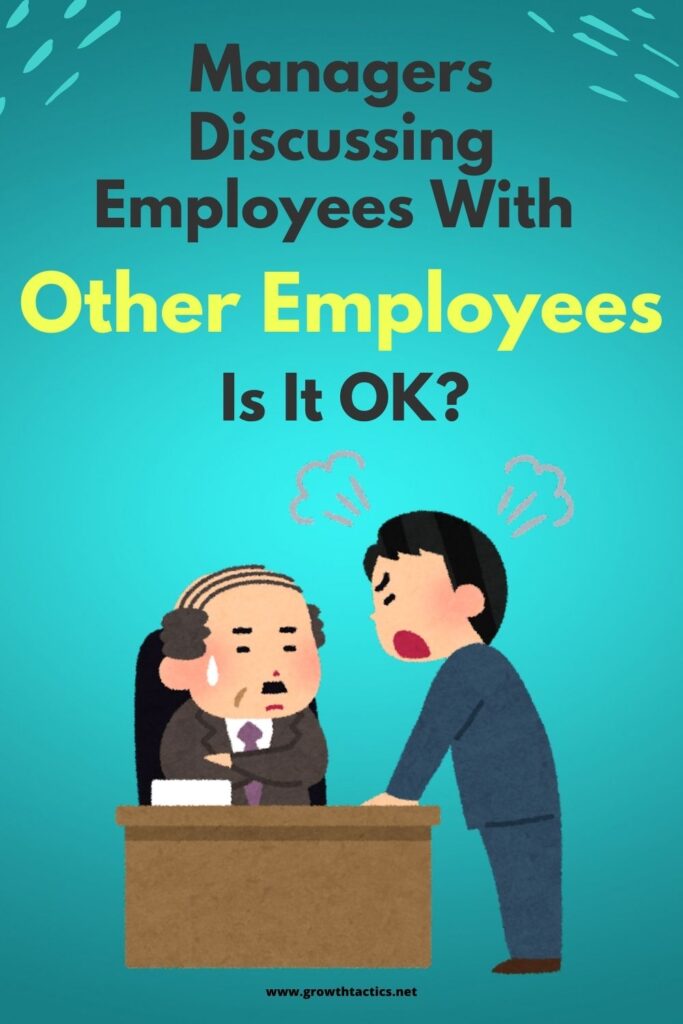As managers, we often feel the urge to share our thoughts and feelings about team members with others. It’s human nature. However, discussing employees with other employees can lead to serious issues. It’s important for managers to maintain professionalism and confidentiality. This article explores the dos and don’ts of such conversations in the workplace.
Jump To Section
Understanding the Context
Let’s explore the concept of managers engaging in conversations about another employee. In a workplace, “discussing employees” can cover various topics. It might mean talking about someone’s job performance, their behavior, or even personal issues they’re dealing with. Understanding these different scenarios can help us see where the line gets drawn.
Imagine a boss needs to talk about an employee’s performance. This could be a chat about why someone is excelling at their job or a conversation about areas where they need improvement. In another case, a manager might have to address workplace conflicts that involve specific coworkers. These discussions are important but must be handled carefully.
Then there’s the trickier area: personal matters. Sometimes, team members go through things outside of work that might affect their performance. It’s tempting to discuss these issues to gather support or solutions but tread lightly here. Personal matters are private and deserve respect.
By breaking it down this way, it becomes clearer where and when such discussions are necessary and when they cross a line. Understanding the context helps in making better decisions about what to share, with whom, and how to handle these sensitive topics responsibly.
Ethical Considerations
When it comes to discussing employees, ethics play a big role. As managers, we must think about confidentiality and trust. Let’s break down why these are so important.
The Importance of Confidentiality
First, confidentiality. Keeping things private is a big deal in any workplace. When managers discuss employees without their knowledge or permission, it can feel like a betrayal. Imagine finding out your manager shared your personal struggles or performance issues with a co-worker. It’s upsetting and can make you feel violated.
Building and Maintaining Trust
Next, let’s talk about trust. Trust is the glue that holds a team together. When employees know their supervisor respects their privacy, they feel safe and valued. On the flip side, if a manager is known for sharing confidential information, trust erodes quickly. This can lead to a toxic work environment where people stay guarded and avoid open communication.
Legal Considerations
Now, let’s touch on legal considerations. Different countries and states have laws protecting employee privacy. These regulations can get employers in trouble if they’re not careful. For example, in some places, sharing sensitive personal information without consent can lead to legal action.
In summary, keeping discussions about employees ethical boils down to respecting privacy and building trust. By doing so, managers nurture a supportive and healthy workplace, while also staying clear of legal pitfalls.
Potential Consequences
Discussing employees without thinking about confidentiality and privacy can have serious consequences. Let’s explore what could happen if these boundaries are ignored.
Damaged Trust
First and foremost, trust between colleagues takes a hit. When employees hear that their private information is shared, they stop trusting their manager. This lack of trust can lead to a lack of respect and even open resentment. Without trust, it’s hard to build a cohesive and productive team.
Low Morale
When trust erodes, morale drops. If employees feel they can’t speak freely or that their issues will be shared without their consent, they’ll start to disengage. A team with low morale is less motivated, less productive, and generally unhappy. This negativity can spread quickly, affecting overall workplace culture.
Increased Turnover
Low morale often leads to higher turnover rates. Good employees may choose to leave rather than stay in an environment where they don’t feel respected or secure. High turnover brings its own problems, such as the constant need to recruit and train new staff, which is both time-consuming and costly.
Legal Repercussions
We can’t overlook the legal side. Mismanaging personal and confidential information can lead to lawsuits. Different regions have laws protecting employee privacy, and breaking these can result in fines or even more severe penalties for the company. Legal issues also damage the company’s reputation, making it harder to attract top talent.
Damaged Team Dynamics
Discussing employees inappropriately can also damage team dynamics. When employees feel insecure, they may start building cliques or silos to protect themselves. This hurts collaboration and makes it harder for teams to work together effectively. It can also lead to conflicts and further disrupt the workplace.
Ignoring professional boundaries and discussing employees inappropriately can have far-reaching consequences. Trust, morale, retention, legal safety, and team dynamics all suffer. It’s in everyone’s best interest to maintain confidentiality and foster a respectful, supportive work environment.
Professional Boundaries

Setting professional boundaries is crucial for effective management. Let’s talk about what this means and why it’s important.
Clear Lines of Communication
First, clear lines of communication matter. As a manager, be upfront about your open-door policy, but also set limits. Let your team know you’re there to support them, but some topics should stay private. For example, performance reviews should only be discussed between the manager and the employee concerned. This keeps things fair and respectful.
Separate Personal and Professional
Next, it’s important to separate personal feelings from professional duties. It’s normal to form opinions about your team members, but you must keep these feelings in check. Sharing personal judgments can lead to favoritism or bias, which harms team dynamics. Focus on facts and professional behavior rather than personal likes or dislikes.
When to Share and When to Hold Back
Knowing when to share and when to hold back is key. If an employee’s issue needs attention, like a conflict affecting the team, handle it discreetly. Discuss the matter only with those who need to know, such as HR or other relevant managers. Avoid gossiping or discussing the issue with the entire team.
Model the Behavior You Expect
Model the behavior you expect from your team. If you want your team to respect each other and maintain confidentiality, you must do the same. Show professionalism in your actions and words. This sets a standard and encourages others to follow suit.
By setting and maintaining professional boundaries, you create a respectful and effective workplace. Clear communication, separating personal feelings, and knowing when to share information are all crucial steps. This helps in building a team that feels valued, trusted, and motivated.
Best Practices for Managers
Being a great manager means knowing how to handle employee information properly. Let’s go over some best practices that can help you maintain a positive and professional work environment.
Keep It Confidential
First things first, always keep sensitive information confidential. If an employee shares personal issues or performance-related concerns, make sure that information stays between you and the relevant parties. Avoid discussing these matters openly or with those who don’t need to know.
Be Transparent About Boundaries
Next, be clear about your boundaries from the get-go. Let your team know what topics are appropriate for public discussion and which should stay private. This helps set expectations and makes sure everyone is on the same page.
Focus on Facts
When you need to discuss an employee’s performance or behavior, stick to the facts. Avoid letting personal opinions influence your discussions. Use specific examples and objective criteria to support your points. This approach is fair and minimizes misunderstandings.
Handle Issues Discreetly
When issues arise, handle them quietly and discreetly. If you need to discuss a problem with another manager or HR, do it in a private setting. Don’t bring up sensitive matters in team meetings or public spaces where others might overhear.
Encourage Open Communication
Encourage open communication within the team, but also stress the importance of privacy. Let your employees know they can come to you with any issues or concerns, and reassure them that their discussions with you will remain confidential.
Set a Good Example
Lead by example. Demonstrate the behavior you expect from your team. If you respect their privacy and handle information responsibly, they’re more likely to follow suit. By setting a good example, you create a culture of trust and respect.
Regular Training
Finally, invest in regular training. Make sure both you and your team are up-to-date on the best practices for handling confidential information. Training can help reinforce the importance of privacy and ensure everyone knows how to handle sensitive matters.
In summary, keeping sensitive information confidential, being transparent about boundaries, focusing on facts, handling issues discreetly, encouraging open communication, setting a good example, and investing in regular training are all essential best practices. By following these guidelines, you foster a respectful and professional workplace where everyone feels valued and secure.
Conclusion
As we wrap up, take a moment to reflect on your own practices. Are there areas where you could improve in maintaining confidentiality? Think about how you handle sensitive information and discuss issues with your team.
Being a good manager isn’t just about leading; it’s about creating an environment of trust and respect. By following the best practices we’ve talked about, you can make a real difference in the workplace.
So, take that look in the mirror. Are you setting a good example? Are you keeping conversations confidential and respecting your team’s privacy? If you see room for improvement, now’s the perfect time to start making those changes.
Remember, small adjustments can have a big impact. By committing to confidentiality and professionalism, you contribute to a happier, more productive team. Thank you for reading, and here’s to creating a workplace where everyone feels respected and valued!


